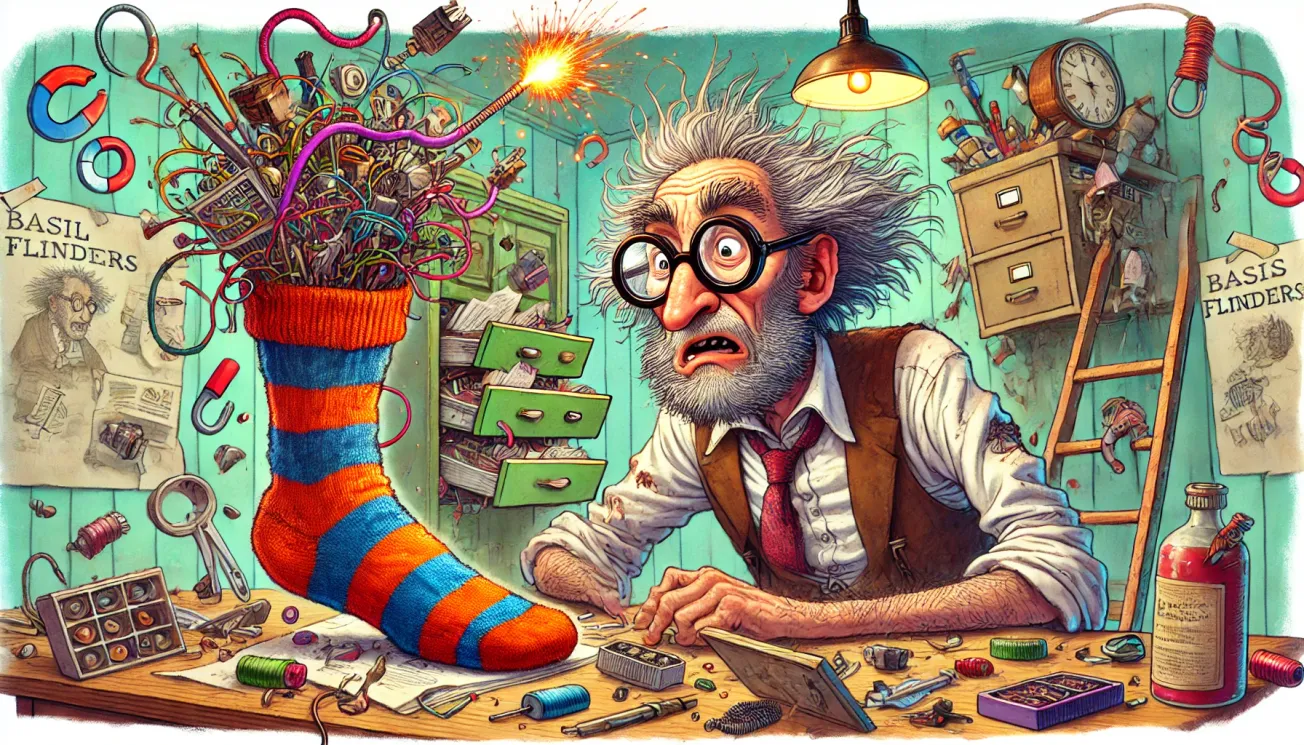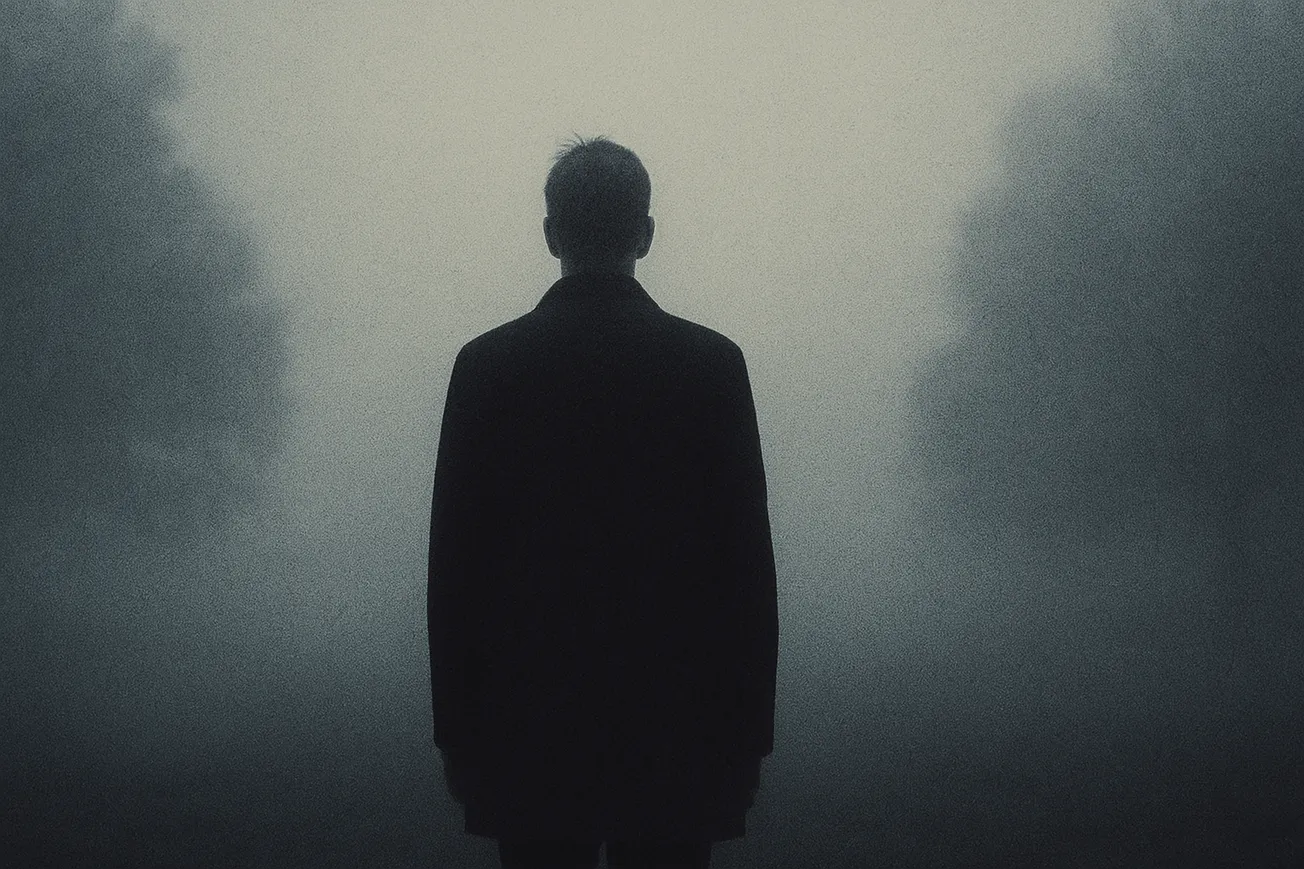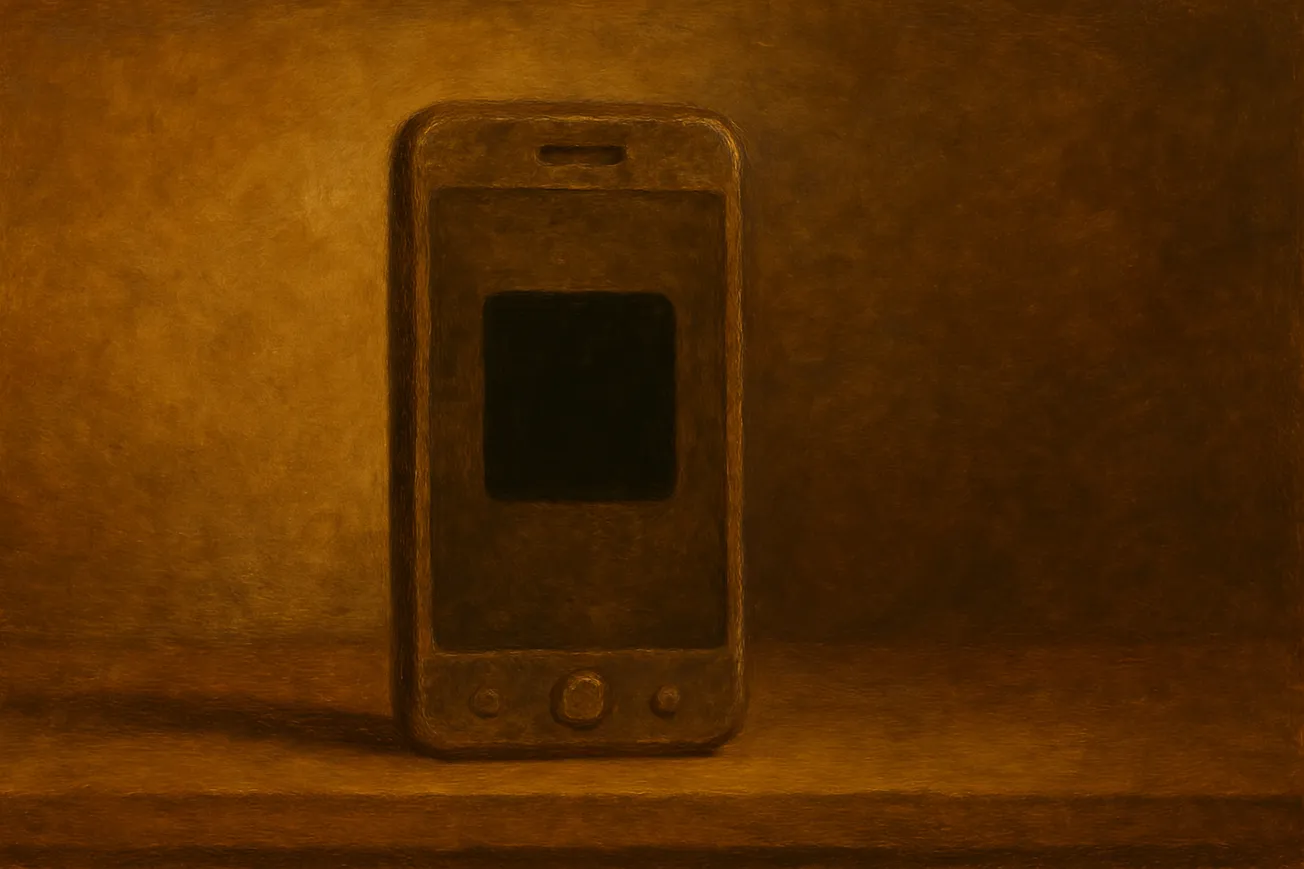Table of Contents
Chapter 1: The Spark
Ever since he was a boy, Basil Flinders had been plagued by brilliance. Ideas popped into his head like toast in a malfunctioning toaster—fast, frequent, and often slightly burned. Some were ridiculous, like his early attempt to invent a spoon that stirred itself (he failed to consider that most people had hands). Others were ahead of their time, like shoelaces that tied themselves (unfortunately, they tied themselves so tightly that ambulances had to be called).
But today—today was different.
Basil sat in his cluttered little workshop, nibbling on the end of a pencil, staring at The Problem. It was a problem so monumental, so maddeningly simple, that he couldn’t believe it still existed in the world.
Socks.
Yes, socks. More specifically, the fact that they always went missing. People spent entire lifetimes searching for socks that had vanished into thin air, and Basil knew the tragic truth: nobody ever found them again.
“But what if…” he murmured, his brain beginning to fizz and pop like a freshly opened soda. “What if I invented a pair of socks that could never be lost?”
It was brilliant. No, better than brilliant. It was world-changing. He could already see the headlines:
GENIUS INVENTOR SOLVES AGE-OLD MYSTERY: NEVER LOSE A SOCK AGAIN!
He cackled with delight. This was it. This was the idea that would finally put his name in the history books (or at the very least, in a mildly interesting magazine article next to an ad for orthopedic shoes).
Basil leapt from his chair, knocking over a half-empty mug of tea in his excitement. He didn’t care. The idea was so simple, so foolproof, that it was practically begging to be built.
“All I need,” he said, rubbing his hands together, “is a tiny bit of elastic… maybe a magnet… or a microchip?”
He paused.
No, no, keep it simple. No need to overcomplicate things.
Grinning like a man who had just discovered the meaning of life, Basil rolled up his sleeves and got to work. Within an hour, he would have a working prototype. Within two, he’d be famous.
By the third hour, he would be on the verge of a complete nervous breakdown.
Chapter 2: The First Attempt
Basil Flinders believed in momentum. A good idea, he knew, had to be acted on immediately, before the brain had a chance to overthink it. Overthinking led to hesitation. Hesitation led to doubt. And doubt led to never becoming a world-famous genius inventor whose face would one day be printed on tea towels.
So he wasted no time.
He grabbed a fresh pair of socks from his drawer—crisp, blue, utterly unremarkable—and laid them on his workbench like a surgeon preparing for an operation.
"The problem," he muttered, twirling a screwdriver between his fingers, "is that socks always get separated. If they were physically attached, they’d never go missing. A simple, elegant fix."
He retrieved a spool of elastic cord and carefully stitched a small loop into the cuff of each sock. Then, he threaded the cord through the loops and tied it off.
"Brilliant," he said, admiring his handiwork. "They’ll stay together in the wash, in the drawer, in the dryer—inseparable."
Feeling smug, he slipped the socks onto his feet.
Immediately, a problem presented itself.
The elastic between them was just a bit too short. When he stood up, he felt a sharp yank at his ankles, as if his feet were suddenly in an unhappy marriage and being forced to hold hands at all times.
He took a step. The socks jerked his feet together, nearly toppling him over.
"Nothing to worry about," he assured himself, hopping back to his workbench. "Just a small miscalculation."
With a quick snip, he cut the elastic and replaced it with a longer, more flexible piece. This time, when he walked across the room, his socks stayed firmly attached but with just enough slack to move freely.
"Yes! That’s it!" he cried. "The world’s first self-pairing socks!"
Pleased with his success, Basil sat down on his chair.
Or rather, he attempted to sit down.
The moment he bent his knees, the elastic contracted. His feet snapped together like the jaws of a bear trap, and he pitched forward onto the floor with the grace of a collapsing bookshelf.
For a long moment, he lay there, staring at the ceiling, trying to recall at what point in his life he had taken a wrong turn.
"Alright," he sighed, dragging himself upright. "Fine. Elastic is out. Maybe magnets?"
He reached for his toolbox.
The Inescapable Sock had only just begun its reign of terror.
Chapter 3: The Snowball Effect
Magnets. Magnets were the answer.
Elastic had been a disaster—Basil still had faint red marks around his ankles from where the socks had nearly garroted his feet—but magnets? Magnets were perfect. Small, strong, and completely invisible once sewn into the fabric.
He worked quickly, slicing open the toe seams of the socks and carefully slipping a tiny neodymium magnet into each one. A quick stitch to seal them back up, and—there it was. The world’s first pair of self-pairing socks, guaranteed never to be lost.
Basil beamed at his creation. This was it. This was the version that would change the world.
He put them on.
At first, nothing happened. The socks looked normal, felt normal—snug, cozy, just like any other pair. But then, as soon as he brought his feet together—
Snap.
The socks clamped together like a bear trap.
His feet locked into place, heel to heel, toes pointing outward in a ridiculous ballerina stance.
Basil flailed his arms, trying to keep his balance. The magnets were much stronger than expected, gripping his feet together with a force that felt vaguely sinister.
He struggled, hopping wildly across the workshop like a penguin in distress. He tried to pry his feet apart with his hands, but the socks refused to budge.
“No, no, no! This is fine! This is totally fixable!” he grunted, dragging himself toward his workbench.
Bang.
His shin collided with the table leg. He toppled sideways, crashing into a stack of books.
Thwump.
The books tipped over, sending an entire toolbox tumbling onto his head.
He lay there for a moment, clutching his skull. "Alright," he muttered. "So maybe the magnets are a bit… too strong."
With great effort, he rolled onto his back like an overturned tortoise and yanked the socks off his feet. The moment they were free, the socks snapped together in midair, clicking into place like two long-lost lovers.
Basil groaned and tossed them onto the workbench.
“Fine. Magnets are out. Maybe… velcro?”
Then he froze.
Something was wrong.
His toolbox. It wasn’t where he had left it. In fact, several of his metal tools were slowly skidding toward the socks.
His screwdriver wobbled on the edge of the table, then suddenly flew across the workbench—
Snap.
It slammed into the socks and stuck.
His pliers followed. Then a handful of screws. Then a pair of scissors.
Basil watched in horror as, one by one, every single metal object in his workshop lurched toward the socks like iron filings to a supercharged magnet.
Something clattered behind him.
He turned his head just in time to see the workshop door handle rattling—the metal knob straining toward the socks, as if some invisible force was trying to rip it off the door.
Then, with a final horrific jolt, the entire filing cabinet on the far wall gave a metallic shudder—
—and slid straight toward him like a hungry, four-drawer monster.
Chapter 4: The Breaking Point
Basil Flinders had many flaws—stubbornness, an inability to read warning signs, an unhealthy belief in his own genius—but above all, he had an unshakable commitment to never admitting when things had gone horribly, catastrophically wrong.
Which is why, instead of fleeing for his life, he stood frozen as the filing cabinet hurtled toward him like a charging rhinoceros.
It slammed into his workbench with an almighty crash, sending a small earthquake through the room. Every metal object within range—hammers, wrenches, nails, an antique letter opener shaped like a sword—was now firmly glued to the socks, forming a chaotic, clanking mass of destruction.
Basil swallowed. The socks, his brilliant invention, now resembled a magnetized black hole, sucking in everything within reach.
"Alright," he murmured. "So maybe… just maybe… the magnets are a touch… overenthusiastic."
Something creaked.
He turned.
The radiator, a large, cast-iron beast bolted to the wall, let out an eerie groan as its screws began wriggling free.
"Oh, no. No, no, no, no—"
The radiator lurched forward.
Basil threw himself to the ground just in time to avoid being flattened. The radiator tore free from the wall, sparks flying, and catapulted itself straight onto the socks with a thunderous clang.
For a moment, there was silence.
Then, slowly, the entire room began to shift.
Every piece of metal still standing—the light fixtures, the chair legs, the hinges on the door—trembled, as if deciding whether to betray their rightful places and join the growing monstrosity.
Basil, now covered in dust and questioning all of his life choices, dragged himself into the farthest corner of the room.
"This is fine," he whispered. "This is… salvageable."
The socks, now a horrific metal tumor, buzzed ominously.
Salvageable? No. No, this was a disaster of historic proportions.
And like any proper disaster, it needed to be destroyed immediately and without a trace.
Basil wiped the sweat from his forehead, then took a deep breath. He knew what had to be done.
He stood up.
He grabbed a broom.
And, very carefully, he nudged the socks toward the door.
They didn’t budge.
The weight of the metal held them firmly in place.
Basil’s eye twitched.
Fine. If they wouldn’t move, he’d have to get creative.
He snatched a long wooden pole, wedged it beneath the socks, and—with every ounce of strength in his feeble inventor’s body—he heaved.
The socks shifted an inch.
Then another inch.
Then, with one final mighty shove, they toppled forward—
—directly onto the exposed electrical wiring from the torn-out radiator.
There was a brilliant blue flash.
A crackling explosion of sparks.
A sizzling sound that suggested something—possibly Basil’s entire future—had just caught fire.
Then, in an instant, the entire workshop went dark.
Basil stared into the pitch-blackness, heart pounding.
He took a deep breath.
Right. Time to start pretending this never happened.
Chapter 5: The Aftermath
For a moment, there was nothing.
No buzzing. No crackling. No hum of machinery. Just silence—the kind of silence that follows a catastrophic mistake, when a person is too afraid to check how bad the damage really is.
Basil Flinders did not move. Moving seemed like a terrible idea.
Something dripped.
It might have been water. It might have been molten metal. It might have been the remains of his self-respect.
Very, very slowly, he reached out and patted the ground around him. His fingers touched something warm and disturbingly soft. He recoiled. It smelled faintly of burnt socks and something far, far worse.
Alright. That was probably fine.
A weak flicker of light came from above as the emergency backup bulb buzzed to life.
His workshop looked like it had been used for target practice by a small, angry army. The walls were blackened. The workbench had collapsed into itself like an exhausted horse. Something was smoldering in the corner, and Basil suspected it used to be his chair.
In the center of the room, something hummed.
It was the size of a bowling ball, but twice as dense and humming like an angry beehive.
Basil took a step back.
It twitched.
He took three more steps back.
Alright. Time for a new plan.
The important thing was to act normal.
He straightened his jacket, brushed the dust from his trousers, and strolled out of the workshop as if nothing had happened.
He shut the door behind him.
Then he locked it.
Then—just to be sure—he locked it again.
Then he dragged a heavy bookshelf in front of the door.
Then a sofa.
Then a particularly large potted plant.
By the time he was finished, the door was thoroughly barricaded, and Basil was standing in his completely undamaged living room, trying very hard to pretend that everything was absolutely fine.
He glanced at the clock.
2:17 in the afternoon.
Plenty of time to do something productive. Something simple. Something not involving magnets.
He walked into the kitchen and switched on the kettle.
Tea. Yes. Tea was good. Tea never exploded.
The kettle began to whistle.
Basil took a deep breath.
Everything was perfectly normal.
Then, from behind the barricaded door, came a clunk.
Basil froze.
A whirr.
A low, electric hum.
The sound of something powering back on.
He turned his head.
The potted plant shuddered.
In the kitchen drawer, a single metal spoon trembled.
And then—
A sock.
Burnt. Tattered. Smoldering at the edges.
It slid out from under the door.
It twitched once—then, very slowly, it began to inch backward, slipping halfway under the door and stopping.
It didn’t go all the way in.
It just sat there, like it was waiting.
Basil’s mouth opened. Then closed. Then opened again.
No sound came out.
The sock was not supposed to do that.
The kettle kept whistling.
Without breaking eye contact, he reached out, took the kettle off the stove, and poured himself a cup of scalding hot tea.
And then he drank the entire thing in one agonizing gulp, because he had officially given up.
Chapter 6 – The Revelation
Basil Flinders did not enter his workshop for two days.
He spent most of that time sitting in his armchair, staring at the barricaded door, occasionally taking nervous sips of tea.
The sock had stopped moving. At least, he thought it had. Every time he glanced away and looked back, it was still there—halfway under the door, exactly where it had stopped.
Waiting.
On the morning of the third day, Basil woke up, shuffled into the kitchen, and poured himself a bowl of cereal.
His hands were tired. His back ached. His brain felt like it had been chewed up and spat out by a lawnmower.
And then—mid-spoonful—it happened.
The Revelation.
It was so stupidly simple, so painfully obvious, that Basil nearly choked on his cereal.
He leapt to his feet, knocking over his chair. For a moment, he stood there, panting, clutching his spoon in a white-knuckled grip as the weight of his own idiocy crashed down upon him.
Then, without another thought, he sprinted toward the barricaded door.
He yanked away the bookshelf, shoved the sofa aside, kicked over the potted plant, unlocked the door, and flung it open.
The sock was still there, exactly where he had last seen it—halfway under the door, waiting.
Basil hesitated. Had it moved at all in the last two days? He wasn’t sure.
Something unpleasant crawled up his spine, but he shoved it down. It didn’t matter. He had to go in.
He stepped over the wreckage of his once-great workshop, barely noticing the burnt walls, the collapsed workbench, the twisted heap of metal that had once been his finest tools.
He went straight to his dresser, yanked open the top drawer, and pulled out…
A safety pin.
He stared at it.
A safety pin.
A single, mass-produced, one-cent safety pin.
A thing so common that children used them for arts and crafts. A thing so idiotically simple that the answer to his problem had been sitting in his house the entire time, mocking him.
Basil grabbed two socks, pinned them together, and shook them violently over his head like a lunatic.
They stayed attached.
No magnets. No elastic. No small-scale industrial catastrophe.
Just socks. Pinned together.
Basil stared at them.
Then he sat down, very quietly, on the floor.
And then he began to laugh.
At first, it was just a small chuckle. Then it grew—louder, deeper, shaking his whole body. He laughed until his stomach hurt, until his ribs ached, until he was wheezing like an old accordion.
He had burned down his workshop. Nearly died. Ruined his reputation. All for a problem that had been solved a hundred years ago.
And it was so deeply, profoundly stupid that he thought he might never stop laughing again.
Chapter 7: The Cycle Continues...
Basil Flinders was finished.
He was done with inventing. Forever.
No more prototypes. No more workshops filled with horrifically bad ideas. No more brilliant flashes of inspiration that ended in flames, injuries, or structural damage.
After all, what kind of man spends months designing a high-tech solution to a problem that had already been solved by a one-cent safety pin?
A fool. That’s who. And Basil Flinders was no fool.
He spent the next two days cleaning up the wreckage. The process was long, painful, and deeply humiliating. He pried melted metal off the walls, swept up piles of ash and charred wood, and scraped what he suspected was part of his toaster off the ceiling.
By the third day, he had locked away his toolbox, stuffed his engineering notebooks into the back of a cupboard, and poured himself the largest, most self-pitying glass of whiskey he had ever consumed.
It was over.
He was free.
That night, for the first time in months, Basil went to bed with no invention on his mind.
And then, at precisely 3:42 a.m., it happened.
The Idea.
It arrived like a bolt of lightning to the brain, shocking him awake.
Basil sat up in bed, heart hammering.
It was so simple. So elegant. So brilliantly obvious that he couldn’t believe nobody had thought of it before.
A toaster… that butters the bread for you.
He swung his legs out of bed, grabbed a notepad and pencil, and began scribbling frantically.
"This one," he whispered, his eyes gleaming, "this one is going to be easy."
But then—his mind kept going.
What if it adjusted for different spreads—peanut butter, jam, cream cheese?
What if it calculated the exact butter distribution for maximum surface coverage?
What if it had an AI system that remembered how much butter you personally liked?
What if it warned you before you ran out of butter, so you never had to experience the heartbreak of dry toast again?
By morning, his entire floor was covered in blueprints. His fingers were smudged with ink. His eyes were wide and bloodshot, but filled with manic joy.
He stumbled to the kitchen, yanked the surviving toaster from the wreckage, and placed it on his workbench.
For a moment, he hesitated.
A small voice in the back of his mind tried to warn him.
It reminded him of the filing cabinet incident.
The radiator disaster.
The moment he watched his entire career quite literally go up in flames.
It whispered, don't do this. You know how this ends.
Basil took a deep breath.
And for the first time, he didn’t ignore it.
He stood there, screwdriver in hand, staring at his blueprints.
It was happening again.
He knew it.
And yet…
A small smile crept onto his face.
Maybe this time, it really would be different.
Maybe not.
Either way, he was going to find out.
And so, the cycle continued.






